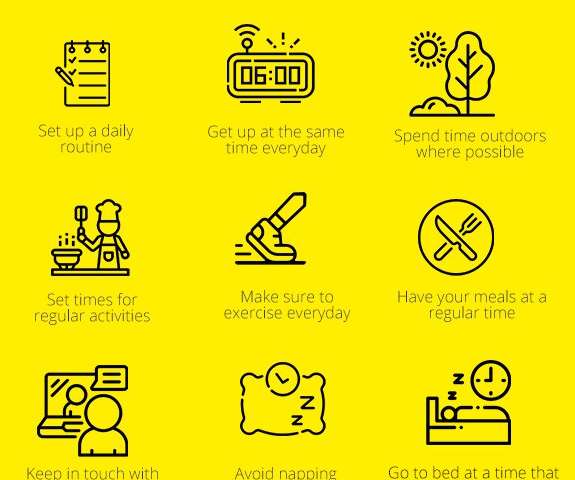
The COVID-19 pandemic poses a serious global health risk.
Governments have been implementing a variety of new regulations to try to stem the spread of COVID-19, including self-quarantine, self-isolation and social distancing. While medically necessary to limit the spread, these new policies are also disrupting many of the stabilizing factors in our lives that support mental health.
“One of the most important systems contributing to our daily wellbeing is the body’s internal biologic clock. This clock keeps our body and our behavior synchronized with the 24-hour cycle of light and dark,” says Professor Greg Murray, Director of the Centre for Mental Health.
Predictable, daily schedules and regular routines help keep our body clock running smoothly. “Research shows that disrupted body clocks are associated with many physical and mental health conditions, including depression, diabetes, obesity and cancer” he adds.
Helping your body clock stay on track during major life disruptions such as the COVID 19 pandemic is important to maintaining positive physical and mental health.
Here are some tips for improving the regularity of your daily routines at a time where nothings feels regular. These recommendations have been co-developed by Professor Murray as part of the International Society of Bipolar Disorders Task Force on Chronobiology and Chronotherapy.
Set up a routine
Routines help stabilize your body clock, so whether you’re working from home or in quarantine, it’s important to set a daily routine for yourself.
Get up at the same time every day
Waking up and starting your day at the same time every day is the most important way to stabilize your body clock.
Spend some time outdoors
Your body clock needs to “see” light in the morning to know that it’s daytime. If you can’t go outside, try to spend some time next to a window to get sunlight and focus on being calm.
Set times for regular activities
Whether you are tutoring your kids, checking in with a friend or cooking making dinner, try to do these activities at the same time each day.
Exercise every day
It’s easy to lose track of time when you’re working from home. Make sure you set aside some time to exercise. This could be going for a walk around the block or doing an online exercise class.
Eat your meals at the same time every day
If you’re not hungry, at least eat a small snack at the prescribed time.
Stay in touch with friends and family
Staying at home and complying with social distancing rules means we now have far fewer social interactions. It’s important at this time to keep in regular contact with friends, family and colleagues. This may be through video calls, phone calls or even real-time text-messaging. Book in these interactions at the same time every day.
Avoid naps during daylight hours
If you must nap, restrict your sleep to 30 minutes. Napping makes it hard to fall asleep at night. Avoid bright light in the evening, including the ‘blue light’ from computer screens and smartphones. Blue spectrum light suppresses the hormone that helps us sleep.
Stick to consistent sleep and wake times that fit your natural rhythm
Source: Read Full Article